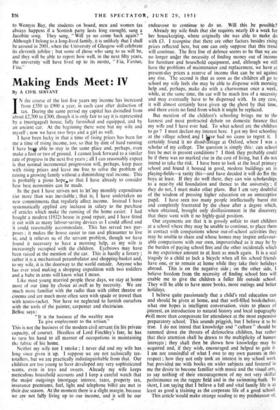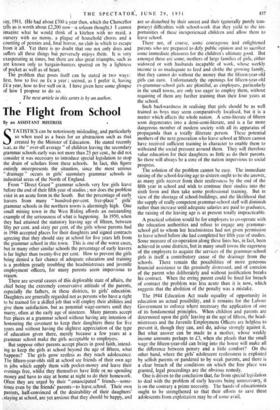Making Ends Meet: IV
By A CIVIL SERVANT
IN the course of the last five in my income has increased from £350 to £900 a year, n each case after deduction of tax. During the same period my capital has dwindled from -about £2,700 to £300, though it is only fair to say it is represented -by a (mortgaged) house, fully furnished and equipped, and by an ancient car. At the beginning there were but my wife and myself ; now we have two boys and a girl as well. I have been lucky in that a time of rising prices has been for me a time of rising income, too, so that by dint of hard running I have be able to stay in the same place and, perhaps. even make a foot or two of ground. I cannot look forward to a similar rate of progress in the next five years ;.all I can reasonably expect is that normal incremental progression will, perhaps, keep pace with rising prices and leave me free to solve the problem of raising a growing family without a diminishing real income.. This is probably a pious hope, so that -I have already to consider how best economies can be made.
In the past I have striven not to leemy monthly expenditure rise more than was inevitable ;_ that is, I have undertaken no new commitments that regularly affect income. Instead I have systematically applied any increase in salary to the purchase of articles which make the running of the home easier. I had bought a modern (1932) house in good repair, and I have fitted it out with as many labour-saving devices as I could afford and it could reasonably accommodate. This has served two pur- poses; it makes the house easier to run and pleasanter to live in. and it relieves us of the servant problem, though we have found it necessary to have a morning help, as my wife is increasingly occupied with the children. Eyebrows may have been raised at the mention of the car. This is hardly a luxury ; rather it is a mechanised perambulator and shopping-basket and, to my wife, it is the doorway to the world outside. Anyone who has ever tried making a shopping expedition with two toddlers and a babe in arms will know what I mean.
Like most young married people these days, we stay at home most of our time by choice as %well as by necessity. We are much more familiar with the radio than with eithee theatre or cinema and are much more often seen with spade or trowel than with tennis-racket. Nor have we neglected to furnish ourselves with the tools of the painter, carpenter and electrician.
Belloc says: "It is the business pf the wealthy man To give employment to.the artisan."
This is not the business of the modern civil servant (in his private capacity. of course). Heedless of Lord Finchley's fate, he has to turn his hand to all manner of occupations in maintaining thc fabric of his home.
Neither my wife nor 1 smoke ; I never did and my wife has, long since given it up. 1 suppose we are not technically tee- totallers. but we are practically indistinguishable from that. Our children are too young to have developed any very sophisticated wants, even in toys and sweets. Already my wife keeps meticulous household accounts and I keep a careful watch that the major outgoings (mortgage interest, rates, property tax, insurance premiums, fuel, light and telephone bills) are met in their due season. At the moment there is a slight margin, because we are not fully living up to our income, and it will be our ,.. endeavour to continue to do so. Will this .be possible?
Already my wife finds that she requires nearly £6 a week for her housekeeping, where originally she was able to make do with £3. I recognise that there are other factors besides rising prices reflected here, but one can only suppose that this trend will continue. The first line of defence seems to be that we are no longer uniler the necessity of finding money out of income for furniture and household equipment, and, although we still have the problems of maintenance and replacement, we have at present-day prices a reserve of income that can be set against any rise. The second is that as soon as the children all go to school my wife feels she may be able to dispense with morning help and, perhaps, make do with a chanvoman once a week, while, at the same time, the car will be much less of a necessity and may eventually have to be dispensed with. In any case, it will almost certainly have, given up the ghost by that time. and there exists no fund from which it might be replaced.
But mention of the children's schooling brings me to the keenest and most protracted debate on domestic finance that my wife and I have ever had. To what school are the children to go ? I must declare my interest here. I got my first schooling at the village school and I Wye had no cause to regret it. I certainly found it no disadvTntage at Oxford, where I was a scholar of my college. The question is simply this: can school fees be met in present conditions ? I think they probably could be if there was no marked rise in the cost of living, but I do not intend to take therisk. I have been to look at the local primary school and found it housed in good, modern buildings set in playing-fields—a rarity this—and have decided it will do fbr the boys at least. If they do well there, they can win scholarships to a near-by old foundation and thence to the university ; if they do not, I must make other plans. But I am very doubtful of the wisdom of pressing higher education on an unreceptive pupil. I have seen too many people intellectually burnt dot and completely frustrated by the chase after a degree which, when obtained, brought only disillusionment in the discovery that there went with it no highly-Raid position. Our arguments are that it is grossly unfair to start children at a school where they may be unable to continue, to place them in contact with companions whose out-of-school activities they may be unable to share and whose homes may inspire unfavour- able comparisons with our own, impoverished as it may be by the burden of 'paying school fees and the other incidentals which in my experience amount to at least as much again. It is a real tragedy to a child to lack a bicycle when all his school friends have one, or to remain at home while they take their holidays abroad. This is on the negative side ; on the other side, 1 believe freedom from the necessity of finding school fees will enable me to give the children a fuller life outside school. They will be able to have more books, more outings and better holidays.
I believe quite passionately that a child's real education can and should be given at home, and that well-filled bookshelves, what one hopes is intelligent conversation, visits to places of 4nterest, an introduction to natural history and local topography &ill more than compensate for attendance at the most expensive preparatory school. This sounds priggish, but I believe it to be true. I do not intend that knowledge and " culture " should be rammed down the throats of defenceless children, but rather that their attention shall be drawn to the multiplicity of human interests ; they shall then be shown how knowledge may be acquired and, if they wish, encouraged and helped to gain it. I am not unmindful of what I owe to my own parents in this respect ; how they not only took an interest in my school work but provided me with books on wider subjects and fostered' in me the desire to become familiar with music and the visual arts, to say nothing of their encouragement of my not very skilful performance on the rugger field and in the swimming-bath. in short, I am saying that I believe a full and vital family life is at least as good 'a training as the corporate life of a good school. This article 'would make strange reading to my predecessor of, say, 1911.. (He had about £700 a year then, which the Chancellor tells us is worth about £2200 now—a solemn thought.) I cannot imagine what he would think of a kitchen with no maid. 3 nursery with no nanny. a plague of household chores and a counting of pennies and, final horror, no club in which to escape from it all. Yet there is no doubt that one not only does and suffers all these things but perversely enjoys them. It is very exasperating at times, but there are also great triumphs, such as are known only to bargain-hunters spurred on by a lightness of pocket as well as of heart. The problem that poses itself can be stated in two ways: first, how to live on Ex a year: second, as 1 prefer it, having Eit a year, how to live well on it. I have given here some glimpse of how I propose to do so.
The next article in this series is by an author.



































 Previous page
Previous page